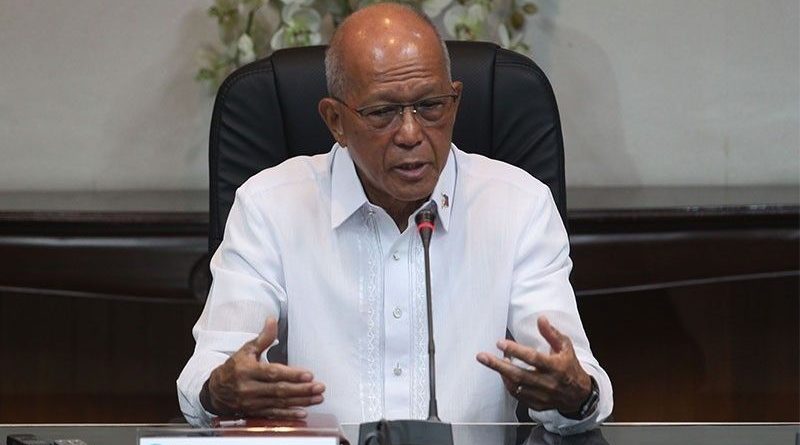OP-ED OPINION: NEWSSTAND- Lorenzana lost his way
By: John Nery
Philippine Daily Inquirer
I’ve met Defense Secretary Delfin Lorenzana only once, briefly, on the sidelines of an event. He was sharp, attentive, and willing to listen, as his reputation led me to expect. Former and current government officials who served or continue to serve at very high levels of government had told me Lorenzana was a straight shooter, a man they respected and that the country could rely on, and because I trusted them I trusted their judgment.
This sense of the man was tested over the years, but by and large I thought that my sources had called it right. My columns reflected that thinking.

In “Destabilization? Opposition can’t even unite” (3/14/17), I described Lorenzana as a “grownup” in the administration, who had the poise and stature to say that criticism of the President “is not destabilization.” In “Duterte’s secret” (12/5/17), I described his adherence to the Constitution as “more intuitive” than that of lawyers: “as soldiers they know they may have to die for it.” In “Ranhilio and the limits of ‘federalism’” (8/14/18), I included him among three Cabinet secretaries pushing back against the administration’s federalism campaign. In “Locsin and other small men” (6/18/19), I noted that it was Lorenzana who was first to issue “a forthright, indignant statement” on the Chinese ramming of the fishing boat Gem-Ver. And in “Duterte heard, but did he listen?” (8/4/20), I defended his action on the “distress signal” sent by the country’s medical societies, that warned about the administration’s “losing battle” against the pandemic, as in fact the deed of an official “acting in good faith.”
To see Lorenzana throwing all this goodwill away, by gratuitously and unilaterally abrogating the 1989 agreement between the University of the Philippines and the Department of National Defense, and then by doubling down on its rationalization, is distressing. First, because the abrogation is a terrible mistake, with serious implications for the country’s democratic project. And second, because his role in it, and his apparent solicitation of support from various Armed Forces units to rush to his defense after he came under heavy public criticism, raises uncomfortable questions about the military’s role as a moderating influence on the administration.
The UP-DND accord, made possible by the precedent set in 1981 by student leader Sonia Soto and defense minister Juan Ponce Enrile, essentially created an additional layer of protection for UP, including “prior notification” made to the UP administration in case of a military or police operation on any of the UP campuses, or when search and arrest warrants will be served “on any UP student, faculty, employee, or invited participants,” or in the event of “any oral or written ‘invitation’ for questioning.” The agreement also provides for noninterference by the military or police in protest actions “within UP premises” by “UP constituents” and immediate notice to the UP administration when “any UP student, faculty, or personnel anywhere in the Philippines” is arrested or detained.

Lorenzana’s Jan. 15, 2021 letter unilaterally abrogating the accord was badly written and poorly reasoned. It described the agreement only as restricting military and police entry into UP campuses without prior notification. This is not true, because other provisions are equally important—for instance, noninterference in UP protest actions—but the abrogation would end those, too. The letter offered only one reason: “Recent events undeniably show that a number of UP students have been identified as members of the Communist Party of the Philippines/New Peoples Army.” This is not relevant, because other schools also have alumni who have joined the insurgency, including the Philippine Military Academy itself. The letter also asserted that the agreement was being used by the CPP/NPA “as a shield or propaganda so that government law enforcers are barred from conducting operations against the CPP/NPA.” This is not evidence-based; in fact, Lorenzana did not even offer any evidence at all.

Lorenzana had created an unnecessary provocation—unnecessary for the conduct of the DND’s objectives, that is. The resulting shock galvanized public criticism.
Lorenzana then made it all worse. In doubling down, he questioned UP’s symbolic status. “What makes UP so special to have this kind of treatment?” He forgot that UP plays an important role as the country’s main state university; it is the standard for other institutions, and is by its nature special. The additional layer of protections it received under the agreement strengthened democratic traditions, and instead of abrogation they should have been extended to all schools.
He got tangled up in his own rationalizations. He angered many when in one tweet he compared UP campuses to a Demilitarized Zone (and outraged many more when he tried to use the popular K-drama “Crash Landing on You” to score cheap points). But if the agreement demilitarizes UP, to use his own offensive term, then abrogating it can only mean remilitarizing it. Simple logic. And yet he still wanted to know why critics say that abrogation means “mini-militarize namin ‘yong UP?”
Different military units and some officials have come to Lorenzana’s defense. But (because the very act of abrogation was rash and unnecessary and baseless) the Armed Forces ended up red-tagging the wrong alumni. An infographic purporting to show dead rebels included someone still alive and another who was not from UP. A general who supports the most extreme administration policies and since 2018 has red-tagged entire universities was back at it. This time, though, Lorenzana’s unilateral act serves to reinforce Lt. Gen. Antonio Parlade Jr.’s extremism.
Our democracy needs a professional, moderate military. If we cannot depend on Lorenzana, who can we rely on?











